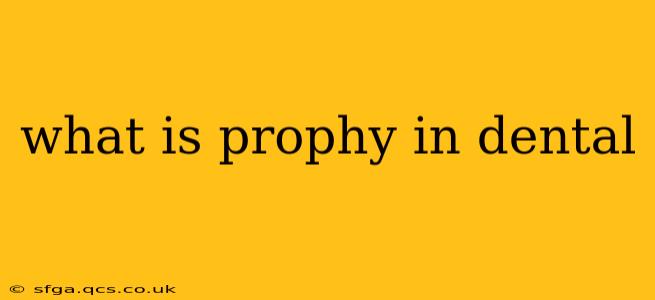In the world of dentistry, "prophy" is a shorthand term for prophylaxis, a crucial preventative dental procedure. It's more than just a simple cleaning; it's a comprehensive approach to maintaining oral health and preventing future dental problems. This guide delves into what a prophy entails, its benefits, and answers frequently asked questions surrounding this essential dental treatment.
What Does a Dental Prophylaxis Involve?
A dental prophylaxis, or prophy, typically involves a thorough cleaning of your teeth and gums. This includes:
-
Removal of Plaque and Tartar: The hygienist uses specialized instruments, including scaling tools and polishing brushes, to meticulously remove plaque (a sticky film of bacteria) and tartar (hardened plaque) from the surfaces of your teeth, both above and below the gumline. Tartar removal is especially important, as it can contribute to gum disease and tooth decay if left untreated.
-
Polishing: After plaque and tartar are removed, the teeth are polished to a smooth surface, making it more difficult for plaque to adhere. This step also helps improve the appearance of your smile.
-
Fluoride Treatment (Often): Many dental professionals apply a fluoride treatment after a prophy. Fluoride strengthens tooth enamel, making teeth more resistant to decay. This is particularly beneficial for children and adults at higher risk of cavities.
-
Oral Health Education: A key component of a prophy is education. Your hygienist will discuss proper brushing and flossing techniques, dietary recommendations for oral health, and answer any questions you may have about maintaining good oral hygiene.
How Often Should I Get a Prophylaxis?
The frequency of professional prophylaxis depends on your individual needs and oral health risk factors. Most dentists recommend at least two prophylaxis appointments per year. However, those with a higher risk of gum disease or cavities might need more frequent cleanings. Your dentist will determine the appropriate schedule during your examination.
What are the Benefits of Getting a Prophylaxis?
Regular prophylaxis offers numerous benefits, including:
-
Prevention of Gum Disease (Gingivitis and Periodontitis): By removing plaque and tartar buildup, prophylaxis helps prevent the development of gum disease, which can lead to tooth loss if left untreated.
-
Prevention of Cavities: Regular cleanings remove food particles and plaque that contribute to tooth decay.
-
Early Detection of Oral Health Problems: During a prophylaxis, your hygienist can identify any early signs of oral health issues, such as cavities, gum disease, or oral cancer, allowing for early intervention and treatment.
-
Improved Breath: Removing plaque and tartar helps eliminate bad breath caused by bacteria buildup.
-
Healthier Gums: Regular cleanings lead to healthier, less inflamed gums.
-
Aesthetic Improvement: Polishing your teeth after a prophy can result in a brighter, healthier-looking smile.
Is a Prophylaxis the Same as a Teeth Cleaning?
While often used interchangeably, there's a subtle difference. A "teeth cleaning" is a general term that encompasses various procedures aimed at cleaning teeth. A prophylaxis, on the other hand, refers to a specific, comprehensive professional cleaning that goes beyond a simple surface cleaning. It includes scaling, polishing, and education, making it a more thorough approach to oral hygiene.
Does Insurance Cover Prophylaxis?
Most dental insurance plans cover at least two prophylactic cleanings per year. However, coverage can vary depending on your specific plan. It's always best to check with your insurance provider to understand your benefits and coverage details before your appointment.
What Should I Expect During a Prophylaxis Appointment?
A prophylaxis appointment usually takes about 30-60 minutes. You can expect your hygienist to carefully clean your teeth and gums, polish your teeth, and provide oral hygiene education. The procedure is generally painless, though you may experience some minor discomfort or sensitivity during the scaling process.
By understanding what a prophy is and its importance, you can take a proactive role in maintaining optimal oral health. Remember, regular professional cleanings are a cornerstone of preventative dentistry and contribute significantly to a lifetime of healthy smiles.
